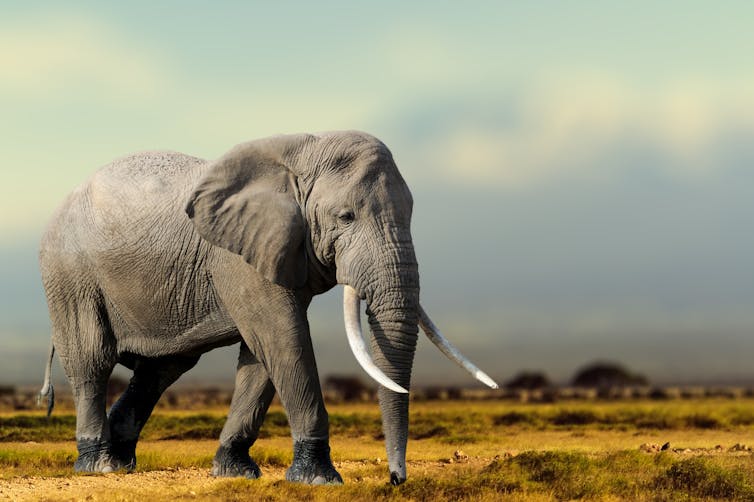Why don't dogs live as long as humans?
- Written by Susan Hazel, Senior Lecturer, School of Animal and Veterinary Science, University of Adelaide
This is an article from Curious Kids, a series for children. The Conversation is asking kids to send in questions they’d like an expert to answer. All questions are welcome – serious, weird or wacky!
If dogs and humans both have a heart and things we need to survive, then why don’t dogs live as long as humans? - Sarah Whiteley, age 11, Brisbane.
Sarah, you have asked a very interesting question. Dogs are mammals like humans, and they have a heart, lungs and all the things you need to survive. Our pet dogs give us so much happiness, but then so much sadness when they die. So why don’t they survive as long as us?
Lifespan is usually related to animal size
Scientists worked out a long time ago that the lifespan of animals is mostly related to their size. Bigger animals usually live longer than smaller animals.
The main reason people used to think big animals live longer is because of something called metabolic rates. A metabolic rate is like how much petrol a car uses - cars that use up their petrol more slowly can drive for longer, a bit like animals with lower metabolic rates. Smaller animals usually have higher metabolic rates, which lead to shorter lifespans, like a car that uses up its petrol very quickly.
The problem is that this doesn’t work for all animals. Some parrots have high metabolic rates but can live for more than 80 years! A metabolic rate is related to heart rate, and some parrots have a heart rate of 600 beats per minute. (Your heart beats around 70 to 100 times per minute.)
And dogs are one of the animals that do not follow this rule.
Read more: Curious Kids: Is it true that male seahorses give birth?
Why do dogs break this rule?
Dogs don’t follow the rules on larger animals living longer. A 70kg Great Dane is lucky to reach seven years, but a 4kg Chihuahua can live for 10 years or more. We still don’t really know why this happens. But if you want a dog that lives longer, you should choose a small breed.
 Small chihuahuas can live for over 10 years.
www.shutterstock.com
Small chihuahuas can live for over 10 years.
www.shutterstock.com
It’s also about survival
People now think it might depend on the “evolutionary pressures” that each animal faces. An evolutionary pressure includes things like other animals that want to kill you for food. Because they are so big, large animals like elephants and whales are less likely to be attacked in the wild than small animals like guppies or mice.
 Large animals like elephants and whales are less likely to be attacked in the wild than small animals.
www.shutterstock.com
Large animals like elephants and whales are less likely to be attacked in the wild than small animals.
www.shutterstock.com
We want to know how to help dogs live longer
There is a lot of scientific research on why dogs age and how to help them live longer. This is partly because we love dogs, and partly because learning about them can help us figure out how humans can live longer too. Dogs suffer from the same kinds of problems that people do as they get older, including getting fat and having painful joints.
Read more: Curious Kids: Where do seagulls go when they die and why don't we find dead seagulls on the beach?
There is a Dog Aging Project with interesting information if you want to find out more. There is even a great website to find out about how long different types of animals live. Scientists have found that although dogs don’t live as long as we do, their life expectancy (how long they live) has doubled in the last 40 years.
Maybe one day in the future our dogs will live as long as we do.
A scientist named Joao Pedro de Magalhaes says that in 1,000 years’ time, a dog could live for 300 years. I think that’s a better use of science than sending the first dog Laika into space, never to return.
Hello, curious kids! Have you got a question you’d like an expert to answer? Ask an adult to send your question to us. They can:
* Email your question to curiouskids@theconversation.edu.au * Tell us on Twitter by tagging @ConversationEDU with the hashtag #curiouskids, or * Tell us on Facebook
 CC BY-ND
Please tell us your name, age, and which city you live in. You can send an audio recording of your question too, if you want. Send as many questions as you like! We won’t be able to answer every question but we will do our best.
CC BY-ND
Please tell us your name, age, and which city you live in. You can send an audio recording of your question too, if you want. Send as many questions as you like! We won’t be able to answer every question but we will do our best.
Authors: Susan Hazel, Senior Lecturer, School of Animal and Veterinary Science, University of Adelaide
Read more http://theconversation.com/curious-kids-why-dont-dogs-live-as-long-as-humans-93374




